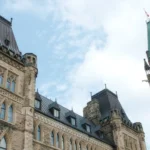A call to podcast hosts and journalists to stop using constitutional rights as an ominous plot point As a true crime podcast and documentary connoisseur by night, and a criminal defence lawyer by day, declaring that my world is saturated with true crime content is an understatement. I enjoy … [Read more...]
Ontario’s Fair Accommodation Practices Act: 70 years later and human rights legislation continues to evolve
1954 saw the passing of Ontario's Fair Accommodation Practices Act and, since then, human rights legislation has evolved across Canada, including with the passing of human rights codes and the Canadian Charter. To a passing tourist in the early 1950s, the town of Dresden might seem like the … [Read more...]
Where are my Charter rights?
An explainer on the Charter's notwithstanding clause and its modern uses. The notwithstanding clause has gotten more popular in recent years. It's been a hot topic with the Saskatchewan government using it recently. But what does the notwithstanding clause do? What is the notwithstanding … [Read more...]
When Can the Right to Freedom of Expression be Curtailed?
Section 2 of the Canadian Charter of Rights and Freedoms protects our freedom of expression, but this freedom is not absolute. The right to express our opinions is a crucial element of a democracy. Freedom of expression is a basic characteristic of personal development. It gives us the right to … [Read more...]
The Significance of the Charter in Canadian Legal History
The Canadian Charter of Rights and Freedoms is a bill of rights - a statement of rights and freedoms that was added to the Constitution in 1982. Looking Back 2017 not only marks 150 years since the British North America Act, 1867 (better known today as the Constitution Act, 1867), came into being, … [Read more...]
BenchPress – Vol 41-5
Get Going Minister! Morteza Momenzadeh Tameh was a member of a resistance group with links to terrorist groups in Iran in the 1980s. He was imprisoned by the Iranian government from 1982 to 1987. After his release he fled to Canada and requested permanent residency in 1994, after being found … [Read more...]
BenchPress – Vol 41-4
Act Of Meanness / Lost by a Nose / Co-Mammas / The Internet and Hate Speech 1. Act of Meanness A Quebec Superior Court Justice recently heard an unusual estate application. A Montreal area woman was convinced that her deceased brother’s wife had been unfaithful to him. At a supper held after … [Read more...]
Organizations Get Religion: Loyola High School v. Quebec
Introduction Do organizations and corporations have a constitutionally protected freedom of religion under the Canadian Charter of Rights and Freedoms? The Charter has existed for 34 years and we are still not clear whether non-human entities enjoy religious freedom as they do other freedoms, … [Read more...]
Prisoners and Work
Several years ago, the Alberta government and other provincial governments considered the introduction of Alabama-style chain gangs as a form of employment for prisoners. This action reflected a North American trend towards making the prison experience harsher, with the view that this would … [Read more...]
R v Fearon : Can Police Search a Cellphone Upon Arrest?
Important Update: Please see the article by Juliana Ho about the Supreme Court of Canada ruling in R. v Fearon. The Supreme Court of Canada decided that the police search of Mr. Fearon's cellphone did breach his Charter s. 8 right to be free of unreasonable search and seizure but decided that … [Read more...]









